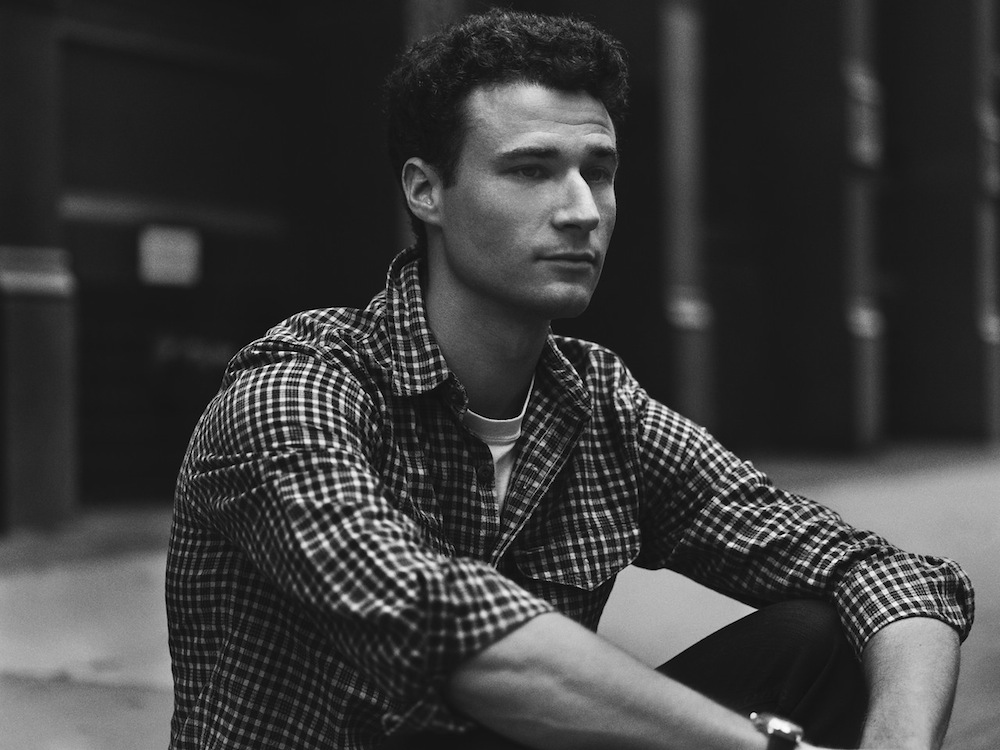Discovery: Harrison Nesbit

HARRISON NESBIT IN NEW YORK, SEPTEMBER 2015. PHOTO: CHRISTOPHER GABELLO.
Once, Agu had a family. He had a mother, a father, aging grandfather, older brother, and younger siblings. He had friends and played imaginary games. He made fun of his brother for trying to impress girls. But when a civil war reaches Agu’s village in an unnamed West African country, his life disintegrates. His mother and younger siblings flee, hoping to find safety in the city; his father, grandfather, and older brother stay to protect their ancestral homeland. No longer a toddler and not yet a man, Agu falls through the cracks.
When Agu later remembers his family, it is utterly devastating. His story is horrific, certainly, but it is 14-year-old Ghanaian actor Abraham Attah’s performance that makes the heartbreak personal. Agu’s trajectory from charismatic, precocious kid to obedient child soldier under the rebel Commandant (Idris Elba) to lost former innocent transforms a far away tragedy into something an urgent responsibility shared by all humans.
Last month, Beasts of No Nation debuted at the Venice and Toronto International Film Festivals. At Venice, Attah and director Cary Fukunaga won individual awards, and there are already whispers of Oscar nominations for both. Out today, the film is the first original feature from Netflix, the first solo project of 24-year-old casting director Harrison Nesbit, and Attah’s first film in any capacity.
Raised in New York, the film world has always been a part of Nesbit’s life: his mother is the veteran casting director Avy Kaufman, and he often had people from the industry over at his family home. “It’s nice because then you start to understand people as people, which I think is the most important,” he explains. After graduating from college in Washington, D.C., Nesbit interned for the production company Parts and Labor and assisted his mother on several films including I Smile Back, A Birder’s Guide to Everything, and Wish I Was Here. He describes Beasts as “the hardest thing I’d ever done and probably one of the hardest things I’ll ever do in my life. I didn’t like the idea of being a scapegoat for why the movie was no good,” he continues.
NAME: Harrison Nesbit
AGE: 24
HOMETOWN: New York City
FAMILY BUSINESS: For me, casting came about fairly easily with my mom being in the business. There was something ingrained in me just from car rides in my childhood listening to her on the phone—something must have stuck. I’ve always loved film, and I was never really sure how I wanted to break into it. I started interning at my mother’s agency my junior and senior years of college and enjoyed the vibe and energy that she had in her office.
FIRST JOBS: Right after graduating college I did a movie with Ira Sachs, Love is Strange. It’s really sweet. It’s got such a nice tone to it. I did background casting for that. It was half-salesman, half-casting because nobody was getting paid. I wasn’t even getting paid in the beginning. So it involved investigative casting where you go to areas in which you think people are going to be responsive to the project and try to get them on board, versus just hanging out on the computer and pulling people. I purposefully only went to gay bars during the day, because I figured if you’re at a bar in the middle of the day, you probably don’t have anything to do. That’s where I got most people, and then hanging out in parks. Some people would feign [familiarity with Ira Sachs]: “Oh I know him, he did this.” “No.” “This?” “No.” “Oh, whatever. I’ll come.”
FIRST SOLO JOB: My mom was friendly with Red Crown, who was producing Beasts of No Nation, and they asked her if she knew anyone who might be able to cast it—they wouldn’t be able to afford a real casting director because the budget was so small, could she recommend anyone. She said no, and then thought of me, because I had gone to India a couple of times with her when she was casting Life of Pi, and they saw, like, 5,000 kids over the span of six months to find Suraj [Sharma]. She recommended me and I had breakfast with Cary. I probably said three things because I didn’t know what was happening. It felt like a very casual conversation; a lot of it was just listening to the story, because I hadn’t read the script and I knew very little in any sort of depth about what it means to be a child soldier. It was more learning about a situation than selling myself, which was nice. I would try to throw something in so he knew I wasn’t a dumb-dumb.
THE SEARCH: I was originally going over to help find Agu. They had done a little bit of preliminary work before but they weren’t happy with the audition process—they had a local Ghanaian casting director doing it. So my job was to go over there and open the net and start thinking about new, creative ways to audition kids. The Ghanaian guy would try to direct his own scenes using some of the scripted material, which never worked because the kids didn’t really know what was going on. Rather than find out who could act and who could play the material, I thought it was wiser to find someone who exhibits qualities that Agu might represent. You want to find someone where it would be believable, if he was in this situation, that he would survive and he would take care of his friends. You needed someone with a natural charisma.
Ghana still suffers from a lot of oppression just because they had a dictatorship for so long. There aren’t a lot of artistic or creative outlets in that country, so things are kind of basic even though you know there’s a real life underneath it. The way schooling works, you are just told what to say all the time: “This is what is correct.” There’s no grey area. So when I started going over there, most of the kids are illiterate, or if they’re not illiterate, to be able to read and memorize something is just going to distract from what’s actually on the paper. So it involved really trying to have conversations with kids and picking up on what their energy was—who they were as people once you stripped everything away that society had painted on them.
THE FIND: I went to Abraham’s school. I remember the day so clearly. It was just one of the worst days. My assistant had asked my driver to pick her up at her house, which was four hours out of the way, so I was very late to go to Abraham’s school. If you don’t show up on this time, then you can’t come in, and it had taken so much work to be able to get into the school and they’d prepared all these students for us, so I was very anxious. I was so pissed off that I ran to the school, because the car was gridlocked. We started interviewing kids and it felt like a waste of time. I saw a couple of kids hanging out under a tree, probably skipping class or something. I had gone over to the soccer pitch, but no one was playing because it was too hot. In this group of 16- and 17-years-old, there were a couple of younger kids who would’ve been Agu’s age, one of whom was Abraham. I asked him and his friends if they wanted to audition and they said no until the older kids pushed them along. We’d either say, “Tell us something about you” or “Do you have something…” and Abraham just started rapping. He was great. We had him come to a callback. Every Saturday we’d rented out a TV station and we’d see hundreds of kids that we’d like and we’d show them clips from movies like Johnny Mad Dog. I’d show one clip that would show aggression and one clip that would show sensitivity, just to see if there was any range, because most of the kids could do one or the other. Abraham had a certain amount of range and a certain confidence. Then there was another scene when he just started crying, this moment of pretending his sister was being taken away. We’d split the day up into two halves—we’d have 150, 100 kids in the morning and then in the afternoon—and Abraham refused to leave.
THE EXTRAS: I’d been going to Liberia to refugee camps to find actors and found some that I felt, “I could totally see these guys as soldiers.” Then on day one of boot camp, the guy who plays Tripod came up to me and said, “Harrison, can I tell you something? I’m a killer. I fought in Liberia. I’m a killer. They can’t know my name. And he’s a killer too.” And we were like, “Holy shit. We have these real soldiers with us.” They thought we were government workers and this was a whole sting meant set them up. It was all paranoia. They’re not wanted. These were low-level guys.
THE CHALLENGES: Meanwhile, our military coordinator had been arrested on the border of Ivory Coast, which put the film in some jeopardy. We had brought over a bunch of Liberian actors [including] this scrawny little man who’s probably killed 500 people. We couldn’t afford to fly them all, so we decided to get a pickup truck and drive them across the border. The Ivory Coast is already really worried about another uprising, so having seven Liberians who are chanting war stuff to get pumped up for this movie, they just put them in prison. We had no idea where they were, so we had no one to train our soldiers. It was serendipitous that we’d accidentally brought real soldiers into the camp.
OTHER PROJECTS: We just did Ang Lee’s most recent film Billy Lynn’s Long Halftime Work. I did a short film called Love Comes Later. I think it will be adapted into a feature. It went to Cannes.
BEASTS OF NO NATION IS OUT TODAY, OCTOBER 16 VIA NETFLIX AND IN SELECT THEATERS.






